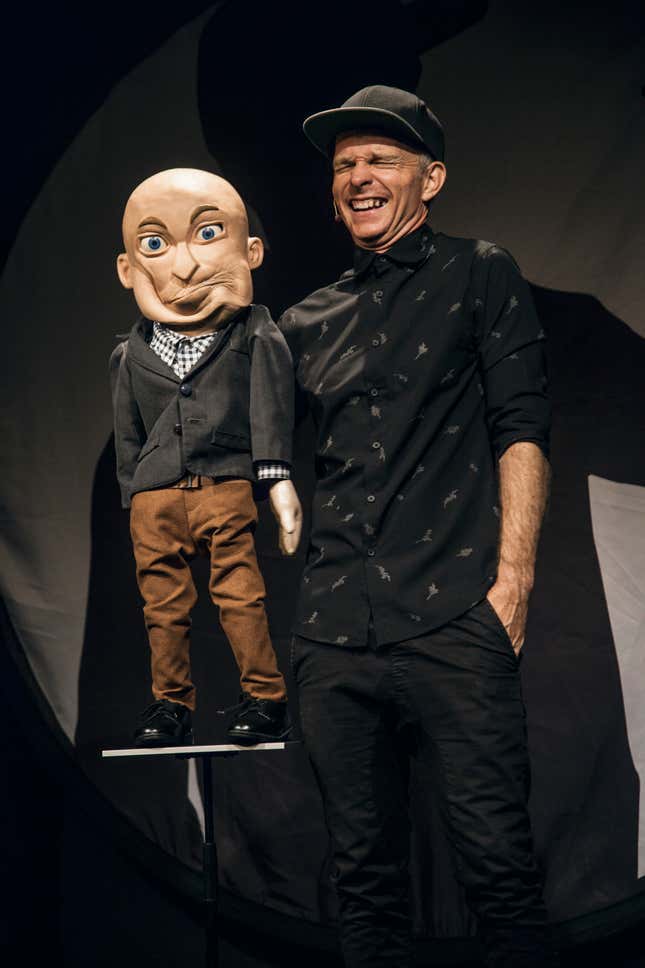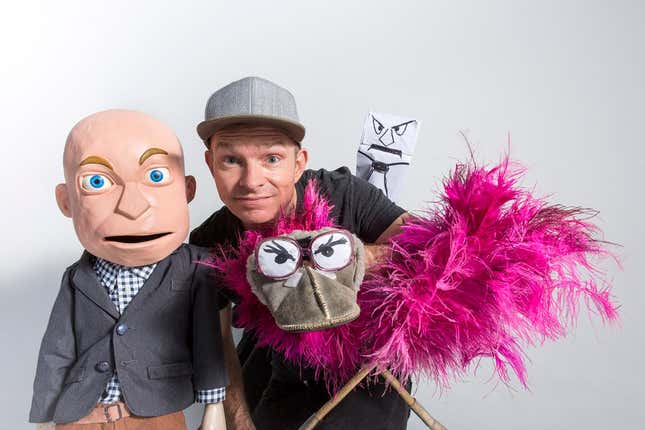With his hand stuck in a simple sock puppet, performer Conrad Koch has rediscovered his favorite part about being on stage: fun.
Few ventriloquists rise to national celebrity, but Koch has done that and more: his puppet is a political phenomenon in South Africa. Chester Missing is a television pundit and analyst who gets to ask politicians the tough questions.
He’s also made from foam and plastic and lives in Koch’s suitcase when he’s not on stage. The puppet is Koch’s most famous performance, and as any good comedy, the evolution of this act is a reflection about South Africa’s own conversation on race and post-liberation politics and the role of white people in that new power dynamic.
To the average South African, however, Missing is hardly an act—just ask the people and politicians lining up to take a selfie with him (Koch, even while holding Missing, is not always required to be in the photo). Missing shot to fame on the local news satire show Late Nite News With Loyisa Gola in 2010.
He was regular guest who spewed profanities and political analysis about the then Zuma administration and the chaotic opposition movements. Missing’s main gig became interviewing politicians who, despite his wisecrack criticisms of them, not only entertained him but gave him candid answers. It’s the kind of access and platform that Koch himself was surprised by, but still takes very seriously.
“I’m telling people white people benefitted from apartheid, and now I’m benefiting from doing that. That’s like benefitting from apartheid twice,” he told Quartz. “It’s a very complex position: I’m the loudest guy in the room when there are plenty of people of colour who are speaking out loudly and well.”

Back then Chester Missing was brown and had an accent. Today, he is white with blue eyes and sounds like a screechier version of his puppet master. Despite his popularity, Koch also faced many uncomfortable questions about whether a white guy behind a black puppet constitutes blackface. His decision to change Missing’s skin tone was eventually driven by an awareness of his own privilege as a white man, even if what the puppet said resonated with black people.
“It’s not white people’s right or role to take on black people’s anger because that is an appropriation,” he said.
At the same time, he infuriated conservative white South Africans, specifically the Afrikaans pop singer Steve Hofmeyr. The singer sought a protection order against the puppet when Missing took him on for saying that black people were the architects of apartheid. Missing won the case, but not before the puppet was manhandled (puppet-handled?) outside court by Hofmeyr’s associate, the right wing author Dan Roodt. It would all have been perfect comedy if right wingers didn’t start harassing and threatening Koch and his wife.
Koch has since taken Missing and the other puppets in his suitcase on the road, performing in the United Kingdom, the United States and Canada. As the intricacies of race and racial prejudice differ between countries, it’s clear that what works in South Africa, may not always translate.
“Even racist white people in South Africa, and I’m not saying we’re all racist—have experienced black stuff, they have black people around them,” he says, using as his example the prejudice but all too familiar scenario of white people assuming a black person ambling in a store must work there. In South Africa where difficult conversations on race are almost inescapable, it gets laughs. In the US and Canada, the response was sensitive and silent.

Being a prominent voice in the conversation about racism and power in post-apartheid South Africa became something of a burden for Koch, even if he was always aware of the privilege of his platform. It is a lot to ask a man with a puppet to have cogent yet comedic answers on some of the country’s toughest questions. So when his new show Puppet Guy trots out a sarcastic ostrich plucked from a slipper and feather dusters, a DJing puppet made from a hoodie and of course Missing, it’s funny not only because of Koch’s undeniable talent, but because he is having as much fun as the audience.
“I can’t be the guy who changes South Africa,” said Koch.
